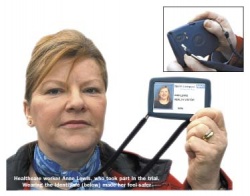Protection for lone healthcare employees
In 2002-2003 around 116,000 incidents of abuse were recorded in the United Kingdom's National Health Service (NHS).

In December 2003, the NHS Security Management Service took responsibility for tackling such incidents. At the same time, as part of a new security management strategy, the Government’s then Secretary of State for Health, John Reid, announced the first trials of a protection system called IdentiSafe.
This is a combination of a device named Identicom and the Orbis call centre support service developed by Orbis PLC. This firm, which protects properties and people throughout Europe, was among the first to pioneer a new level of lone worker protection that provided exact location techniques and 24/7 response centre support to summon appropriate help to anyone caught up in an adverse incident. The firm employs 800 people in a network of branches throughout Europe, and the system now protects thousands of lone workers.
Orbis director, David Armstrong, said: ‘Our facility can deal with and hold thousands of recordings of incidents and their locations. Users can be assured of confidentiality. Information concerning them will only be accessed when they indicate an emergency. The recording of information is electronic and automatic and doesn’t rely on operators writing it down. All communications are recorded on to DVD and are instantly available to our operators and can be used later as evidence in any legal proceedings.’
The countrywide trials proved the system could indeed increase protection for NHS workers.
Volunteers from North Liverpool Primary Care Trust (PCT) were among those to be issued with the IdentiSafe device, which resembles a normal identity card but contains the latest mobile technology to link to the Orbis 24/7 Monitoring Centre. Worn like any ID card holder, the device can be operated without breaking eye contact with an aggressor.
Before making each visit, the British volunteers used the mobile device to transmit and record their whereabouts on the response centre software. If, later, they had cause to hit the panic button, the response centre operators could retrieve the information, listen in on line and take appropriate action - summoning the police if necessary (the centre can also bypass the 999 emergency telephone operator for extra speed and effectiveness).
Health visitor Anne Lewis, who mostly works alone in the community, visiting children under five years old and their families in their own homes. She reported that the device made her feel much safer. ‘I visit up to 10 families a day. You never know what you might encounter. I heard of a health worker being locked in an empty building for hours. No one knew she was there. If she’d had this device, the call operators would have sent help to her. The device is easy to use. I recorded my whereabouts each time I walked up to a house for an appointment. It is very discreet. It does not look like a panic alarm. To avoid inflaming the situation, no one need know that you are pressing an alarm button.’
In the trials, the IdentiSafe unit used the Vodafone UK network. It is now available through Vodafone as well as Orange networks. For the public sector, Orbis Monitoring and Vodafone UK also signed an agreement with the Office of Government Commerce (OGC) to deliver Vodafone UK’s new Lone Worker Protection Identisafe device with the Orbis monitoring and response service directly through OGC Buying Solutions division.
Details: www.cybertrak.net
23.05.2006





